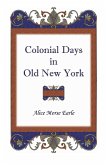The book traces significant changes in twentieth-century American culture through the career of Gilbert Seldes. It was Seldes' book The Seven Lively Arts that produced a wide debate among intellectuals about the so-called "popular arts" (film, broadcasting, cartoons) and their importance to American culture.
Today, New York stands as the capital of American culture, business, and cosmopolitanism. Its size, influence, and multicultural composition mark it as a corner-stone of our country. The rich and varied history of early New York would seem to present a fertile topic for investigation to those interested colonial America. Yet, there has never been a modern history of old New York--until this lively and detailed account by Michael Kammen. Gracefully written and comprehensive in scope, Colonial New York includes all of the political, social, economic, cultural, and religious aspects of New York's formative centuries. Social and ethnic diversity have always been characteristic of New York, and this was never so evident as in its early years. This period provides the contemporary reader with a backward glance at what the United States would become in the twentieth-century. Colonial New York stood as a precursor of American society and culture as a whole: a broad model of the American experience we witness today. Kammen's history is enlivened by a look at some of the larger-than-life personalities who had tremendous impact on the many social and political adjustments necessary to the colony's continued growth. Here we meet Peter Stuyvesant, director of New Netherland and an executive of the West India Company--a man facing the innumerable difficulties of governing a large, sprawling colony divided by Dutch, English, and Indian settlements. Ultimately, history would view him as a failure, but his strong, Calvinist approach left such an indelible stamp on the burgeoning colony that readers will be tempted to do a little revisionist thinking about his tenure. Looking at alater governor, Lord Cornbury, gives us the very opposite example of a man despised by his contemporaries as the most venal of all the colonial governors (he was an occasional public cross-dresser, wearing the clothes of his distant cousin, Queen Anne), but who forcefully
Hinweis: Dieser Artikel kann nur an eine deutsche Lieferadresse ausgeliefert werden.
Today, New York stands as the capital of American culture, business, and cosmopolitanism. Its size, influence, and multicultural composition mark it as a corner-stone of our country. The rich and varied history of early New York would seem to present a fertile topic for investigation to those interested colonial America. Yet, there has never been a modern history of old New York--until this lively and detailed account by Michael Kammen. Gracefully written and comprehensive in scope, Colonial New York includes all of the political, social, economic, cultural, and religious aspects of New York's formative centuries. Social and ethnic diversity have always been characteristic of New York, and this was never so evident as in its early years. This period provides the contemporary reader with a backward glance at what the United States would become in the twentieth-century. Colonial New York stood as a precursor of American society and culture as a whole: a broad model of the American experience we witness today. Kammen's history is enlivened by a look at some of the larger-than-life personalities who had tremendous impact on the many social and political adjustments necessary to the colony's continued growth. Here we meet Peter Stuyvesant, director of New Netherland and an executive of the West India Company--a man facing the innumerable difficulties of governing a large, sprawling colony divided by Dutch, English, and Indian settlements. Ultimately, history would view him as a failure, but his strong, Calvinist approach left such an indelible stamp on the burgeoning colony that readers will be tempted to do a little revisionist thinking about his tenure. Looking at alater governor, Lord Cornbury, gives us the very opposite example of a man despised by his contemporaries as the most venal of all the colonial governors (he was an occasional public cross-dresser, wearing the clothes of his distant cousin, Queen Anne), but who forcefully
Hinweis: Dieser Artikel kann nur an eine deutsche Lieferadresse ausgeliefert werden.








